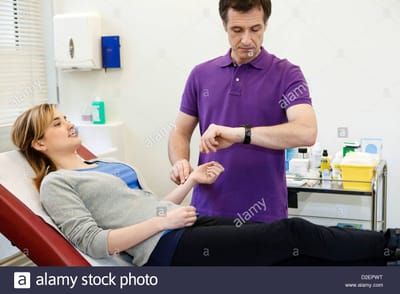LOW PULSE RATE

For some people, a slow heart rate does not cause any problems. It can be a sign of being very fit. Healthy young adults and athletes often have heart rates of less than 60 beats a minute.
In other people, bradycardia is a sign of a problem with the heart's electrical system. It means that the heart's natural pacemaker isn't working right or that the electrical pathways of the heart are disrupted. Sometimes, the heart beats so slowly that it doesn't pump enough blood to meet the body's needs. This can cause symptoms, such as feeling dizzy or weak. In some cases, it can be life-threatening.
causes
- Changes in the heart that are the result of aging.
- Diseases that damage the heart's electrical system. These include coronary artery disease, heart attack, and infections such as endocarditis and myocarditis.
- Conditions that can slow electrical impulses through the heart. Examples include having a low thyroid level (hypothyroidism) or an electrolyte imbalance, such as too much potassium in the blood.
- Many types of medicines. Examples include antidepressants, heart medicines, and opioids.
A very slow heart rate may cause you to:
- Feel dizzy or lightheaded.
- Feel short of breath and find it harder to exercise.
- Feel tired.
- Have chest pain or a feeling that your heart is pounding or fluttering (palpitations).
- Feel confused or have trouble concentrating.
- Faint, if a slow heart rate causes a drop in blood pressure.
You can find out how fast your heart is beating by taking your pulse. If your heartbeat is slow or uneven, talk to your doctor.
How is bradycardia diagnosed?
Your doctor may take your pulse to diagnose bradycardia. Your doctor might also do a physical exam, ask questions about your past health, and do an electrocardiogram (EKG or ECG). An EKG measures the electrical signals that control heart rhythm.
Bradycardia often comes and goes, so a standard EKG done in the doctor's office may not find it. An EKG can identify bradycardia only if you are actually having it during the test.
You may need to wear or carry a device called a portable, or ambulatory, electrocardiogram. Examples include a Holter monitor and a cardiac event monitor. You might use it for a day or more. It records your heart rhythm while you go about your daily routine.
You may also have blood tests to find out if another problem is causing your slow heart rate.
TREATMENT
How bradycardia is treated depends on what is causing it. Treatment also depends on the symptoms. If bradycardia doesn't cause symptoms, it may not be treated. You and your doctor can decide what treatment is right for you.
- If damage to the heart's electrical system causes your heart to beat too slowly, you will probably need to have a pacemaker. A pacemaker is an implanted device that helps correct the slow heart rate.
- If another medical problem, such as hypothyroidism or an electrolyte imbalance, is causing a slow heart rate, treating that problem may cure the bradycardia.
- If a medicine is causing your heart to beat too slowly, your doctor may adjust the dose or prescribe a different medicine.
DO AT HOME
Bradycardia is often the result of another heart condition, so taking steps to live a heart-healthy lifestyle will usually improve your overall health. The steps include:
- Having a heart-healthy eating plan that includes vegetables, fruits, nuts, beans, lean meat, fish, and whole grains. Limit alcohol, sodium, and sugar.
- Being active on most, if not all, days of the week. Your doctor can tell you what level of exercise is safe for you.
- Losing weight if you need to, and staying at a healthy weight.
- Not smoking.
- Managing other health problems, such as high blood pressure, high cholesterol, and diabetes.
Pacemakers
Most people who get pacemakers lead normal, active lives. You will need to avoid things that have strong magnetic and electrical fields. These can keep your device from working right. But most electronic equipment and appliances are safe to use.
Your doctor will check your pacemaker regularly. Call your doctor right away if you have symptoms that could mean your device isn't working right, such as:
- Your heartbeat is very fast or slow, skipping, or fluttering.
- You feel dizzy, lightheaded, or like you might faint.
- You have shortness of breath that is new or getting worse.
Heart Rate Problems: Should I Get a Pacemaker?
